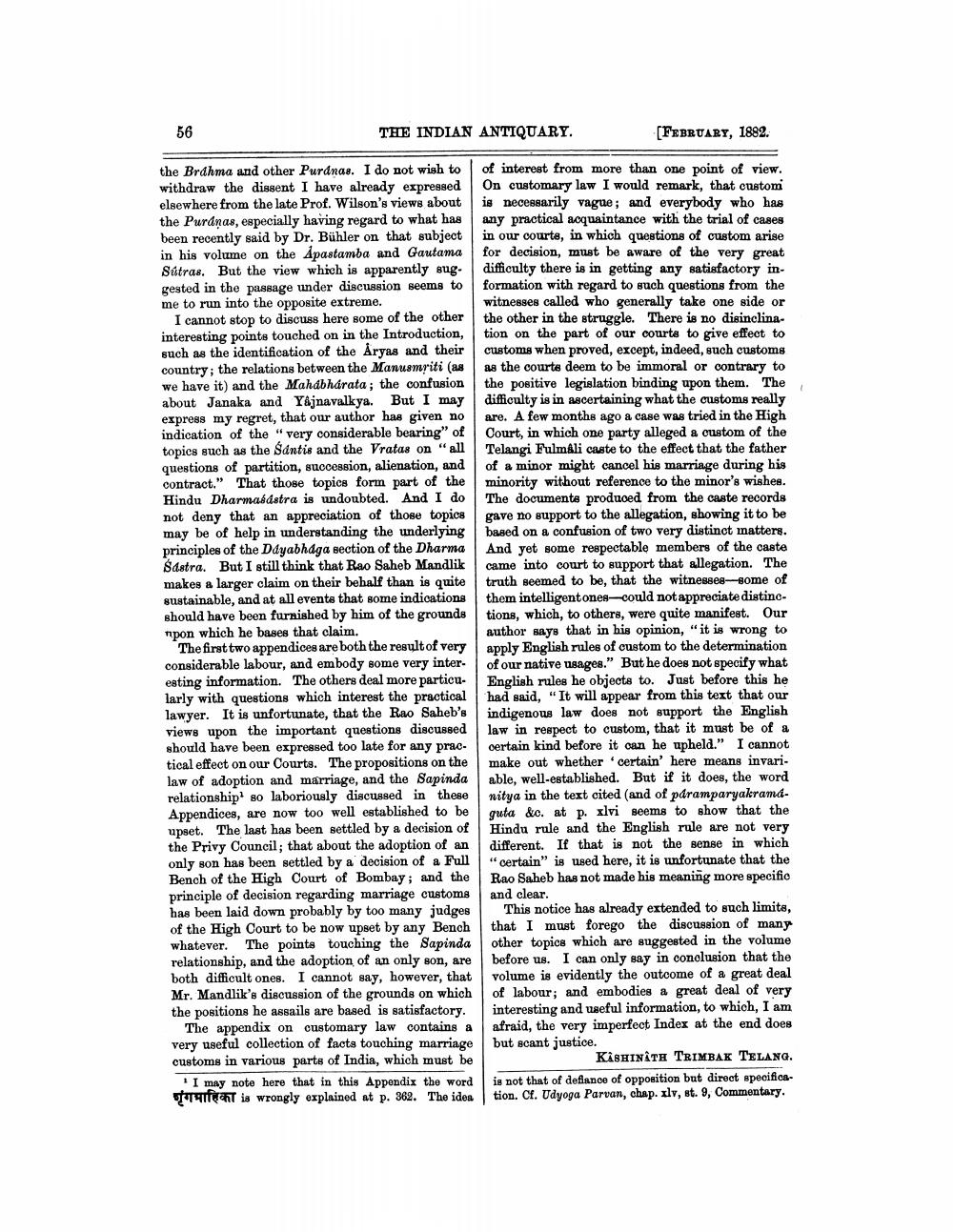________________
56
THE INDIAN ANTIQUARY.
(FEBRUARY, 1882.
the Brdhma and other Purdnas. I do not wish to of interest from more than one point of view. withdraw the dissent I have already expressed on customary law I would remark, that custom elsewhere from the late Prof. Wilson's views about is necessarily vague; and everybody who has the Purdnas, especially having regard to what has any practical acquaintance with the trial of cases been recently said by Dr. Bühler on that subject in our courts, in which questions of custom arise in his volume on the Apastamba and Gautama for decision, must be aware of the very great Sutras. But the view which is apparently eug- difficulty there is in getting any satisfactory in. gested in the passage under discussion seems to formation with regard to such questions from the me to run into the opposite extreme.
witnesses called who generally take one side or I cannot stop to discuss here some of the other the other in the struggle. There is no disinclinainteresting points touched on in the Introduction, tion on the part of our courts to give effect to such as the identification of the Aryas and their customs when proved, except, indeed, such customs country, the relations between the Manusmriti (as as the courte deem to be immoral or contrary to we have it) and the Mahabharata; the confusion the positive legislation binding upon them. The about Janaka and Yájnavalkya. But I may difficulty is in ascertaining what the customs really express my regret, that our author has given no are. A few months ago a case was tried in the High indication of the very considerable bearing" of Court, in which one party alleged a custom of the topics such as the Santis and the Vratas on "all Telangi Fulmâli caste to the effect that the father questions of partition, succession, alienation, and of a minor might cancel his marriage during his contract." That those topics form part of the minority without reference to the minor's wishes. Hindu Dharmasastra is undoubted. And I do The documente produced from the caste records not deny that an appreciation of those topics gave no support to the allegation, showing it to be may be of help in understanding the underlying based on a confusion of two very distinct matters. principles of the Ddyabhaga section of the Dharma And yet some respectable members of the caste Sastra. But I still think that Rao Saheb Mandlik came into court to support that allegation. The makes a larger claim on their behalf than is quite truth seemed to be, that the witnesses--some of sustainable, and at all events that some indications them intelligentones-could not appreciate distincshould have been furnished by him of the grounds tions, which, to others, were quite manifest. Our mpon which he bases that claim.
author says that in his opinion, "it is wrong to The first two appendices are both the result of very apply English rules of custom to the determination considerable labour, and embody some very inter- of our native usages." But he does not specify what eating information. The others deal more particu- English rules he objects to. Just before this he larly with questions which interest the practical I had said, "It will appear from this text that our lawyer. It is unfortunate, that the Rao Saheb's indigenous law does not support the English views upon the important questions discussed law in respect to custom, that it must be of a should have been expressed too late for any prac. certain kind before it can he upheld." I cannot tical effect on our Courts. The propositions on the make out whether certain' here means invari. law of adoption and marriage, and the Sapinda able, well-established. But if it does, the word relationship so laboriously discussed in these nitya in the text cited (and of pdramparyakrama. Appendices, are now too well established to be guta &c. at p. xlvi seems to show that the upset. The last has been settled by a decision of Hindu rule and the English rule are not very the Privy Council; that about the adoption of an different. If that is not the sense in which only son has been settled by a decision of a Full "certain" is used here, it is unfortunate that the Bench of the High Court of Bombay; and the Rao Saheb has not made his meaning more specific principle of decision regarding marriage customs and clear. has been laid down probably by too many judges This notice has already extended to such limits, of the High Court to be now upset by any Bench that I must forego the discussion of many whatever. The points touching the Sapinda other topics which are suggested in the volume relationship, and the adoption of an only son, are before us. I can only say in conclusion that the both difficult ones. I cannot say, however, that volume is evidently the outcome of a great deal Mr. Mandlik's discussion of the grounds on which of labour; and embodies a great deal of very the positions he assails are based is satisfactory. interesting and useful information, to which, I am
The appendix on customary law contains a afraid, the very imperfect Index at the end does very useful collection of facts touching marriage but scant justice. customs in various parts of India, which must be
KASHINATH TRIMBAK TELANG. "I may note here that in this Appondix the word is not that of deflance of opposition but direct specificsTY T is wrongly explained at p. 362. The idea tion. Cf. Udyoga Parvan, chap. xlv, st. 9, Commentary.




